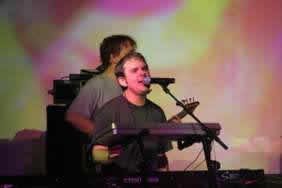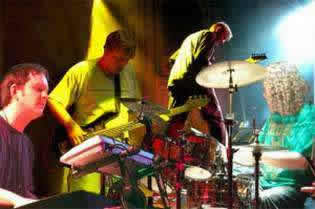Taking the heritage of Discipline could be a heavy task... especially if you are Matthew Parmenter's nephew, but Ryan does not want to make Discipline-2. Actually the young Parmenter with his Eyestrings immediately distinguished himself for a very personal Prog rock, even if he surely pays something to his uncle's band. A serious passion and a very little tense to the emulation approach carried the band to release two albums in two years, rich of personality and definitely enjoyable. We thought to have a chat with Ryan to let him tell us the history of his band.

How did the idea to form Eyestrings started?
When I was in my last year of college, I got a call to come jam with a few friends, including Mathew Kennedy. This was after Discipline had stopped playing, and Mathew was trying to keep musically active. I had been writing music for years, and they thought I might bring something interesting to their jam sessions. Soon I began bringing in some songs that I had written for the others to learn, but the others in the group had difficulty making a real commitment to anything more than casual playing. Mathew and I were both interested in recording and playing out as a real band.
In 2001, we started searching for some other musicians to fill out a band. I instantly thought of my friend Alan Rutter, a great guitarist who had just moved back to our hometown in Michigan after living in California for 2 years. I started working with Alan on a song I had written called “Empty Box,” and it was a bit of a struggle at first, but before too long he was playing the melodies beautifully. Now with the three of us playing throughout the summer, we were ready to audition drummers. We put an advertisement in a local paper and auditioned 3 guys, and played with one for a short time, but it was not quite working, and soon after that Mathew called Bob Young, with whom he had played in a later lineup of Discipline. We loved playing with Bob, and Bob enjoyed playing the more complex pieces, and we were able to convince him to get on board. That’s how we got started.
I noticed that you almost are the only author of music and lyrics: what's other members' contribution?
I still do a large bulk of the composition, but both albums were produced by Eyestrings, not just me. Every member of the band has excellent creative input for every other member. Whether it’s bending a guitar note, adding a certain drum fill, making the vocals more dynamic, choosing the right keyboard sound, or tweaking notes of a bass line, each of us contributes the sound of the band. The way I see it, is that I can put notes together, but only the band can really bring the notes to life. I strongly feel that Eyestrings will be done the day that any one of us could not do it anymore.
You already had the chance to play in big festivals, like ROSfest. How was the reaction of the attendance? Do you keep any particular memories of it?
Performing at a venue like ROSfest is a dream come true for musicians like me. Progressive music is definitely a niche, and so I have found that potential fans tend to be relatively few and far between. So at ROSfest and similar festivals, you have this amazing concentration of progressive music lovers in one place, and being able to play to so many people who could appreciate the music was absolutely thrilling. The audience was entirely attentive and respectful, and they reacted enthusiastically at peaks in the music. For me, it was probably the most exciting performance so far. And talking with the other musicians and friendly fans after the show was also quite fun. I will remember it as a very positive experience.
our new album sounds more obscure than the previous one but also more homogeneous: what pushed you to choose this particular direction for your music?
This goes back to the band’s involvement at every level. On the first album, “Burdened Hands,” we recorded many songs that I had written before the band even existed, so it was more eclectic. On “Consumption,” the songs were written for Eyestrings, and we were all tending to enjoy the darker aspects of the music, so that’s why the new album is more ominous. We had been playing together for almost 4 years by the time we went to record the second album, and we had developed a more distinct sound for ourselves. Mathew was also composing—he and I both developed the segments he had written for what ended up being “Code of Tripe.” And the whole band somewhat improvised our short opening piece, “All Sales Final.” Furthermore, we were able to record the core tracks for the album over one week in our friend’s studio, Windfall Recording, in Hammondsport, New York. All of these factors helped us to create a much more distinctive Eyestrings project from start to finish with “Consumption.”
Is there any connection between this mood and the lyrics? The lyrics themselves seem to be more complex: which themes did you touch?
A lot of the lyrical content of “Consumption” is about oppression, whether political, personal, or self-imposed. In “Valid for a Week,” for instance, there are two distinct voices—one lamenting in the verses and the other shouting orders in the chorus and in the coda. In “Lifelines,” there are many points of view represented. Basically, I was interested in dealing with struggles in many forms, and generally changes in the music represent a thematic or mood change as well. I definitely enjoy the old-Genesis-style storytelling approach to lyrics, but sometimes it’s best to let the music tell its share of the story. More and more, I try to find a balance between the lyrics and the music conveying the mood.
What kind of feelings do you want to arouse in listener's mind? Is there a particular message you wish to pass to your public?
I want to arouse feelings of tension, and then play with those feelings. Sometimes that means release of tension, and other times it means piling on the tension until it’s almost too much to bear. The “Feast” section of “Code of Tripe” is probably a good representation of Eyestrings just layering on the tension. I am not arrogant enough to think that any messages in our music will really make a difference in the world, but there is definitely a message of maintaining control of one’s own life running throughout “Consumption.” In “Valid for a Week,” the chorus goes, “Believe everything you read,” which is the kind of bullshit you would hear from any totalitarian organization. So that line is definitely ironic. I actually feel that one should read as much as possible and be careful about what to believe. Living in supposedly “free” America has become much scarier under the administration of the past 5 years, and some of the lyrics take that struggle as a starting point. It’s important that people remember that any organization—government, religion, corporation—is only as powerful as its members allow it to be.
The comparison with Matthew is unavoidable: do you think your uncle's experience has been somehow useful for you? Do you think that being a parent of such an important person for Progressive music should give you more responsibility, pushing you to make always better?
I have always been a huge fan Matthew Parmenter’s music. When I was a teenager, it was exciting to see him perform, and I am lucky to have known a lot more of his music than most Discipline fans will likely hear. I went to Discipline gigs when I was in high school, and the band has certainly been one of my favorite influences. I owe Matthew the debt of name recognition and influence—I suspect that certain people were willing to give Eyestrings a listen because of the names “Parmenter” and “Kennedy” and the Discipline connection. But I never meant to be “Discipline 2”, and I think Eyestrings are very much a unique band.
I do wish to create better music all the time, but it is a personal goal, not a reaction to some sense of “responsibility” to progressive music. I certainly hope enough people will enjoy our music to make putting out more CDs a worthwhile venture, but I will continue to try to make better music no matter what.
When listening to your music, the name Echolyn jumped to my mind several times. What's the reason, in your opinion, of this likeness?
I do enjoy Echolyn, and I am most familiar with their album “As the World.” I suppose the general similarities between Eyestrings and Echolyn would be complexity, melody, and the initial “E.” Otherwise, I am not sure that we are very similar. They certainly have much more complex vocal harmonies than we have ever had in our music.

I read that you chose the name of your band getting inspired by Shakespeare. Is it the verse taken from Cymbeline: "I would have broke mine eyestrings, crack'd them but To look upon him, till the diminution"? What's the reason for this choice?
My girlfriend and I were skimming Shakespeare looking for interesting words, and she happened upon that verse. I loved the word, the visceral meaning of it, and that it was a very simple compound word, but an uncommon compound. I like the verse, that it has to do with careful scrutiny, which seems appropriate for our music. But it was really the word itself that I enjoyed more than the passage. And the concept of “eyestrings” also worked well for a very disturbing album cover!
Your singing is far from being plain and linear: to whom do you inspire?
My biggest vocal and lyrical influences would probably be Peter Gabriel, Ben Folds, and Thom Yorke of Radiohead. Each one of them writes incredibly clever lyrics, and they all have uniquely beautiful voices and incredible versatility. I don’t have the strongest voice, but I do make a point to make my vocals interesting and dynamic, and I enjoy exploring the different qualities of my own voice on different pieces. I believe my voice has become stronger since our first album, and I hope that if I keep experimenting that it will just keep getting stronger.
|